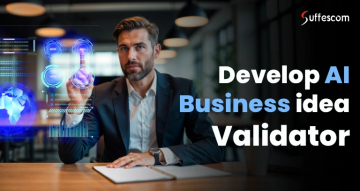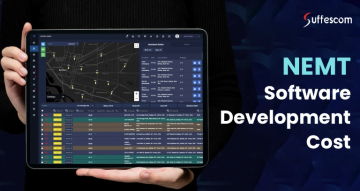How to Build an AI Agent in 7 Steps: A Complete Guide

Artificial Intelligence (AI) is no longer just a buzzword- it's the fuel powering today's innovative businesses, from streamlining operations to creating mind-blowing user experiences. AI agents are altering industries and redefining what's possible. However, let's face it: building an AI agent sounds super complex - a playground for tech wizards with PhDs. Right? Not anymore.
Thanks to advancements in AI integration services, it's now easier than ever to automate tasks. AI agents can perform some basic tasks; sometimes, the whole scenario can be significant. This not only simplifies the workforce but also enhances productivity. Moreover, it acts as a game-changer for businesses that continuously look ahead of the competition.
Marketing and ecommerce teams say AI implementation is their #1 priority.
What Is An AI Agent?
An AI agent is a software program capable of perceiving its environment, processing relevant information, and taking action to achieve a goal without human intervention.
Think of it like a self-driving autonomous car—it uses sensors like radars and cameras to gather data, assess road conditions, anticipate obstacles, and make split-second decisions on the go. In a similar way, AI agents in software applications collect inputs, analyze patterns, and autonomously take the right actions to complete tasks efficiently and intelligently.
Key Aspect of AI Agent
Intelligent Decision-Making: They understand the data and evaluate the best action.
Contextual Perception: They extract information from their surroundings, such as voice, text, images, or structured data.
Operational Autonomy: They can function independently with minimal to zero human intervention.
Adaptive Learning: They learn from interactions and evolve with time.
Ready to Scale Up with AI Agents!
Contact Suffescom today to discover how our AI development services can revolutionize your business.
How Do AI Agents Work?
As described above, the purpose of AI agents is to ease up and automate complex workloads within an organization. In most cases, the AI agents follow a predefined workflow when executing the set tasks as described below:
Identify the goals
The user prompts AI agents with a goal or instruction to follow. Based on the goal, the AI agent then determines the proper plan and action to accomplish the goal, including breaking down the goals into small, easy-to-accomplish tasks, ensuring the user gets relevant results.
Access Information
For AI agents to plan and execute their tasks well, they require proper information to plan the whole process. For instance, AI agents can get conversation logs for accurate results when analyzing customer sentiments. AI agents can also search for and extract information from the internet. Again, in some instances, some AI agents integrate with other machine learning models or other agents to exchange or get specific data.
Implement Tasks
With the data collected, AI agents can now execute the tasks following the set instructions. With one task complete, the AI agent removes the task and continues to the next task. Yet, with every complete task, the AI agent seeks approval from the external environment to verify the effectiveness of the solution delivered to the set goals.
Advantages of AI Integration Service In This Tech-Driven World

Enhanced Efficiency and Productivity
AI development services streamline workflows by automating repetitive tasks, freeing time for employees to focus on strategic and creative initiatives.
Data-Driven Decision-Making
AI-powered insights assist companies in making perfect decisions by analyzing enormous quantities of statistics quickly and correctly.
Cost Reduction
AI-driven tools like chatbots, customized guidelines, and predictive analytics enhance customer satisfaction and engagement.
Improved Customer Experiences
AI-driven tools like chatbots, personalized recommendations, and predictive analytics enhance customer satisfaction and engagement.
Scalability
AI Integration Services permit companies to scale operations efficaciously, adapting to increasing demands without significant manual effort.
Competitive Edge
Organizations leveraging AI gain a technological advantage, staying ahead of competitors in innovation and market responsiveness.
Seamless System Connectivity
AI integration services enable smooth integration of AI with existing tools and platforms, ensuring a unified, efficient ecosystem.
Better Risk Management
AI helps identify potential risks and anomalies in real-time, allowing businesses to proactively mitigate issues.
Faster Innovation
AI fosters innovation by enabling rapid prototyping, testing, and deployment of new ideas and solutions.
Sustainability and Environmental Impact
With optimized processes, AI Integration Services contribute to reducing energy consumption and waste, supporting eco-friendly business practices.
Optimize Your Operational Costs with Smarter AI Agents
Minimize AI costs while maximizing efficiency. Partner with us to build scalable, future-proof AI solutions. Get started today!
Key Components of AI Agents for Businesses
While different types of AI agents work in various environments to accomplish diverse goals following different instructions, they all have standard components that AI integration service providers should keep in mind before implementing it into any business:
Architecture
This is the basis of an AI agent, a software program, a physical structure, or a combination of two. A robotic AI agent, for instance, has motors, sensors, robotic arms, and actuators. The architecture hosting such an AI agent can be databases, API, or text prompts to complete the processes.
Agent Function
This represents the data collection processes and is manipulated to perform specific functions concerning the agent's goal. The uniqueness of an agent function lies in the type of information, feedback mechanism, AI functionality, and knowledgebase, among other technical aspects.
Agent Program
This is a process of executing the agent function. The process is all about AI agent development, training, and deployment to the defined architecture. The agent program must meet the business concept, performance, and other technical aspects.
Learning Capability
The integration of machine learning models within AI agents enables them to learn from previous experiences. This learning mechanism enhances their capabilities through time. The agents improve their behavior through performance analysis and user interaction data, improving accuracy and decision outcomes.
Decision-Making Mechanism
Through this part, agents assess choices while making decisions by processing data through defined systems or learned algorithms. Strategic decision-making systems allow agents to deliver maximum performance while operating through changing environments.
Communication Interface
AI agents demand a communication pathway between users and other programs for system interaction. The system interfaces consist of natural language processing functions for chatbots, application programming interfaces for system connections, and sensory elements for physical agents.
Knowledge Base
A well-defined knowledge base gathers all data rules and learned insights the agent uses to carry out assignments and make decisions. The agent keeps developing new knowledge during its ongoing interaction with its environment.
Goal Orientation
Every AI agent receives specific operational instructions from which it derives its actions. Every operational step the agent takes must match the established objectives, whether the task involves problem resolution or user interface betterment.
Feedback Mechanism
Through a feedback system, agents acquire information about their actions to determine if their targets are met before modifying their procedures. Real-time feedback from the system helps improve both learning and performance maximization.
Security and Compliance
AI agents should implement security protocols and data privacy regulations to maintain safe and ethical operations when business data requires protection.
7 Key Steps of Building AI Agents
The idea of implementing an AI agent is indeed remarkable. Now, you need to make it a product that works for your business. Our team at Suffescom uses seven key steps to develop an AI agent, including:
1. Establish the Agent's Purpose and Context
The first step in building an AI agent is defining its reason and the environment wherein it will operate. Whether it’s customer service, process automation, or predictive analytics, the agent’s desires must align with your business goals. During this segment, we:
- Identify key use cases for the AI agent.
- Define measurable effects, including improved performance or customer pride.
- Assess feasibility and alignment with your enterprise model.
For instance, if your goal is to streamline customer service, leveraging AI integration services can help deploy chatbots with advanced Natural Language Processing (NLP) capabilities.
2. Collect, Cleanse, and Prepare Crucial Data
AI agents thrive on high-quality data. Poor or unstructured data leads to inaccuracies and inefficiencies. Here’s how we ensure data readiness:
| Step | Description | Tools Used |
| Data Collection | Gather data from various sources (APIs, logs, databases) | Python, Apache Kafka |
| Data Cleaning | Remove errors, duplicates, and irrelevant data | Pandas, OpenRefine |
| Data Transformation | Convert data into a usable format for AI models. | TensorFlow, PyTorch |
| Data Storage | Store data in scalable, secure repositories | AWS S3, Google BigQuery |
Through our AI development services, we ensure the data pipeline is robust and scalable, minimizing AI cost in the long term.
3. Build a Competent Development Team
Creating a high-performing AI agent requires a multidisciplinary team of professionals consisting of:
- Data Scientists: To design and train machine learning models.
- Software Engineers: To construct the architecture and integrate AI dealers into current structures.
- Project Managers: To make sure timelines and dreams are met.
Our AI integration services provide access to a seasoned team experienced in deploying AI solutions tailored to your business needs.
4. Choose the Appropriate Technology and Tools
The right tools and technologies are essential for building powerful AI agents. Factors influencing the choice consist of:
- Business Goals: Determine whether equipment like TensorFlow (for ML) or RPA systems (for automation) is required.
- Integration Capabilities: Ensure compatibility with existing structures and the usage of APIs.
- Scalability: Select tools that can handle growing statistics and consumer demands.
For example, we leverage cloud-based platforms like AWS or Azure to optimize AI development costs and enhance system scalability.
5. Architect the AI Agent
Architecting entails designing both the software program framework and, in some cases, the bodily additives (e.g., sensors for robots). Key concerns include:
- Core Functionalities: Define strategies along with evaluation of facts, choice-making, and user interactions.
- User Interface (UI): Incorporate an intuitive layout for seamless interplay.
- System Connectivity: Integrate the AI agent with CRMs, ERPs, or other employer tools.
Our AI integration services ensure the architecture is flexible and future-proof, reducing maintenance costs and ensuring consistent performance.
6. Conduct Thorough Testing of the AI Agent
Testing ensures the AI agent operates as expected. This phase consists of:
- Functional Testing: Verifying every feature works successfully.
- Performance Testing: Ensuring the agent can handle real-world needs.
- Security Testing: Identifying vulnerabilities to guard sensitive information.
Through our AI development services, we use equipment like Selenium for UI testing and Apache JMeter for load checking, ensuring the AI agent provides reliable performance.
7. Launch and Continuously Monitor the AI Agent
Once the AI agent passes all tests, it’s deployed in the goal surroundings. Continuous tracking is essential to ensure premiere overall performance and discover regions for development. Key duties encompass:
- Performance Monitoring: Use dashboards to music KPIs.
- Feedback Loops: Implement mechanisms to accumulate user remarks.
- Regular Updates: Train the agent to conform to new scenarios and statistics.
Our AI integration services include post-launch support, ensuring the agent remains effective as business needs evolve.
Conclusion
Building an AI agent is no longer a distant dream it’s a practical reality that can transform your business by saving time, cutting costs, and unlocking data-driven insights. By following these seven steps defining your purpose, preparing quality data, assembling the right team, selecting robust tools, architecting thoughtfully, testing rigorously, and monitoring continuously you can create an AI agent tailored to your unique needs. As AI technology evolves, partnering with an expert AI agent development company like Suffescom can ensure your solution stays ahead of the curve, delivering scalable, innovative results. Ready to revolutionize your operations? Start building your AI agent today and step into the future of business efficiency.
FAQs
1. How much does AI cost to implement in an existing business?
Well, it depends upon your requirements and the complexity of those requirements. However, an average AI solution may cost around $6,000 to over $150,000, including development and implementation.
2. What are the key steps in training an AI agent?
The steps to train an AI agent can be outlined as follows:
- Assemble your development team
- Gather and preprocess your data
- Choose your tech stack
- Design your AI agent
- Test and enhance your AI agent’s capabilities
Once these steps are finished, you can deploy your AI agent into your desired domain.
3. What kind of data does an AI agent need to function?
During development, AI agents require data from prompts, text, images, videos, sensor data, and other formed and structured data. This training is related to industry, work culture, premises rules, and regulations.
4. How do I choose the right AI integration service provider for my AI agents?
You need proper documentation of requirements and expected outcomes to choose the best AI team for implementing AI agents in your business. Then, you should find the best AI development team to help you achieve those goals with less hassle.









